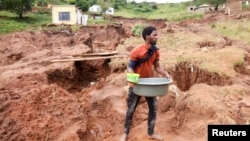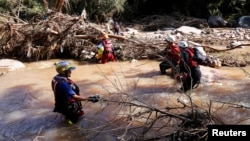South African President Cyril Ramaphosa declared a state of disaster late Monday following deadly floods in the country's eastern KwaZulu-Natal province. Record floods have left more than 440 people dead, an estimated 40,000 people homeless and damaged critical infrastructure and hundreds of schools.
The declaration is expected to speed up much-needed aid to the flood-hit area in a crisis that comes just two weeks after South Africa lifted its disaster declaration for the coronavirus pandemic.
The national government is immediately directing $68 million to clean up what officials have called catastrophic flooding that has left people homeless and without water or electricity.
Imtiaz Sooliman, head of the charity Gift of the Givers, described the organization’s work to distribute aid since the floods hit last week.
“We’re getting the job done,” Sooliman said. “We're getting delivery done. Hot meals, hygiene packs, sanitary pads, diapers, and blankets and mattresses and water.”
Sooliman said there was a need for water in the areas because water pipes had washed away.
“We tried to get as much water to as many people as possible,” Sooliman said.
While the city of Durban and the surrounding province of KwaZulu-Natal was the worst hit, other provinces like the Eastern Cape also saw flooding and deaths.
Officials are still quantifying the damage to critical infrastructure like the Durban Port, highways and telecommunications.
Nkosazana Dlamini-Zuma, the minister of Cooperative Governance and Traditional Affairs who is leading the response, told a media briefing Tuesday the scale of the disaster requires a national response.
“In a way it gives hope and also is a vessel for coordination and rallying the entire nation, the entire government and also the international support,” Dlamini-Zuma said.
Climate change was highlighted as a cause of the flooding’s severity. But poor infrastructure and city planning — with many informal settlements located in vulnerable low-lying areas — was another factor.
Dlamini-Zuma said while the disaster brought a great deal of sorrow, it also poses an opportunity.
“We should be building back better,” Dlamini-Zuma said. “Nobody should build back in the riverbanks and in floodplains but also in some of the areas that are geographically not right for residential areas.”
But people living in the worst-hit communities, particularly informal settlements in low-lying areas, say they doubt promises of better housing will be kept.
The settlement called Mega Village in south Durban had been hit by floods in 2017 and 2019. Cosmos Khanyeza, a community volunteer, helped victims in the earlier floods and last week’s.
“Those people are looking at the proper way to be away from that river so that they won't become victims again,” he said. “Those people from 2019 floods didn't get any help. They were just in their transition camp houses. There was a budget for them but they never even seen a cent of that budget.”
Khanyeza said most people can’t afford to rebuild, let alone look for safer areas to erect a new metal shack.
For now, he said, foam mattresses and blankets were delivered by the government Monday so victims can sleep more comfortably at a temporary shelter in a community hall.
Sooliman, who leads Gift of the Givers, said recovering the dead and basic humanitarian needs remain the focus before larger infrastructure can be considered.
“People have lost everything, all their material values,” Sooliman said. “So basically the funding is, right off, the simple stuff. And then of course you repair the schools and the hospitals.”
Officials said the port of Durban, the busiest in southern Africa, has been severely disrupted by the weather but will be cleared and operational again in the next six days. Other timelines for rebuilding roads and repairing more than 600 schools have yet to be announced.
Officials said the overall disaster declaration is expected to remain in place for three months to provide enough time and resources to rebuild.





